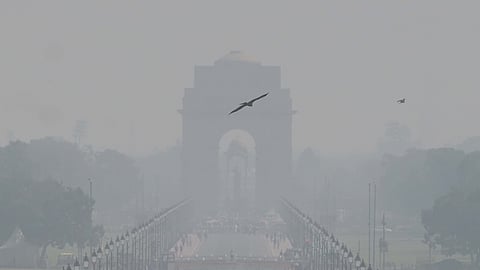

NEW DELHI: Delhi’s air quality improved to the “poor” category on Saturday, two days after Diwali, as strong surface winds helped disperse pollutants in the city.
The average air quality index (AQI) in Delhi was recorded at 291 (poor) at 8 am, an improvement from the AQI of 339 (very poor) measured at 4 pm on Friday. The change came despite widespread violations of the city’s firecracker ban on both Thursday and Friday evenings. Before the celebrations on Thursday, the AQI was 328 at 4 pm, remaining stable until 9 pm but then gradually worsening- reaching 330 by 10 pm, 338 at midnight, 347 by 3 am and peaking at 362 by 9 am on Friday.
Strong surface winds of 10-15 km/hr and above-average temperatures for this season then helped improve air quality. By noon on Friday, the AQI was 354, dropped to 339 by 4 p.m., and further improved to 314 by 10 pm, as per reports.
The concentration of PM2.5 -- fine particles which easily penetrate the respiratory system and pose serious health risks, especially for children, the elderly and those with pre-existing respiratory conditions -- also exceeded the safe limit.
According to CPCB, the Air Quality Index scale categorizes AQI values between 0-50 as ‘good’, 51-100 as ‘satisfactory’, 101-200 as ‘moderate’, 201-300 as ‘poor’, 301-400 as ‘very poor’, and 401-500 as ‘severe’.
In cities such as Delhi and others in northern India, pollution levels peak during the winter season due to emissions from vehicles, industries, garbage burning and construction, besides stubble burning after the paddy season in neighbouring States with particles being trapped in the cold air.
Unfavourable winds in the early winter months that don’t flush the pollutants out also lead to a faster build-up. Firecracker burning has also contributed to exacerbating air quality during this period.
On Saturday, city’s minimum temperature was recorded two notches above normal at 17.1 degrees Celsius.